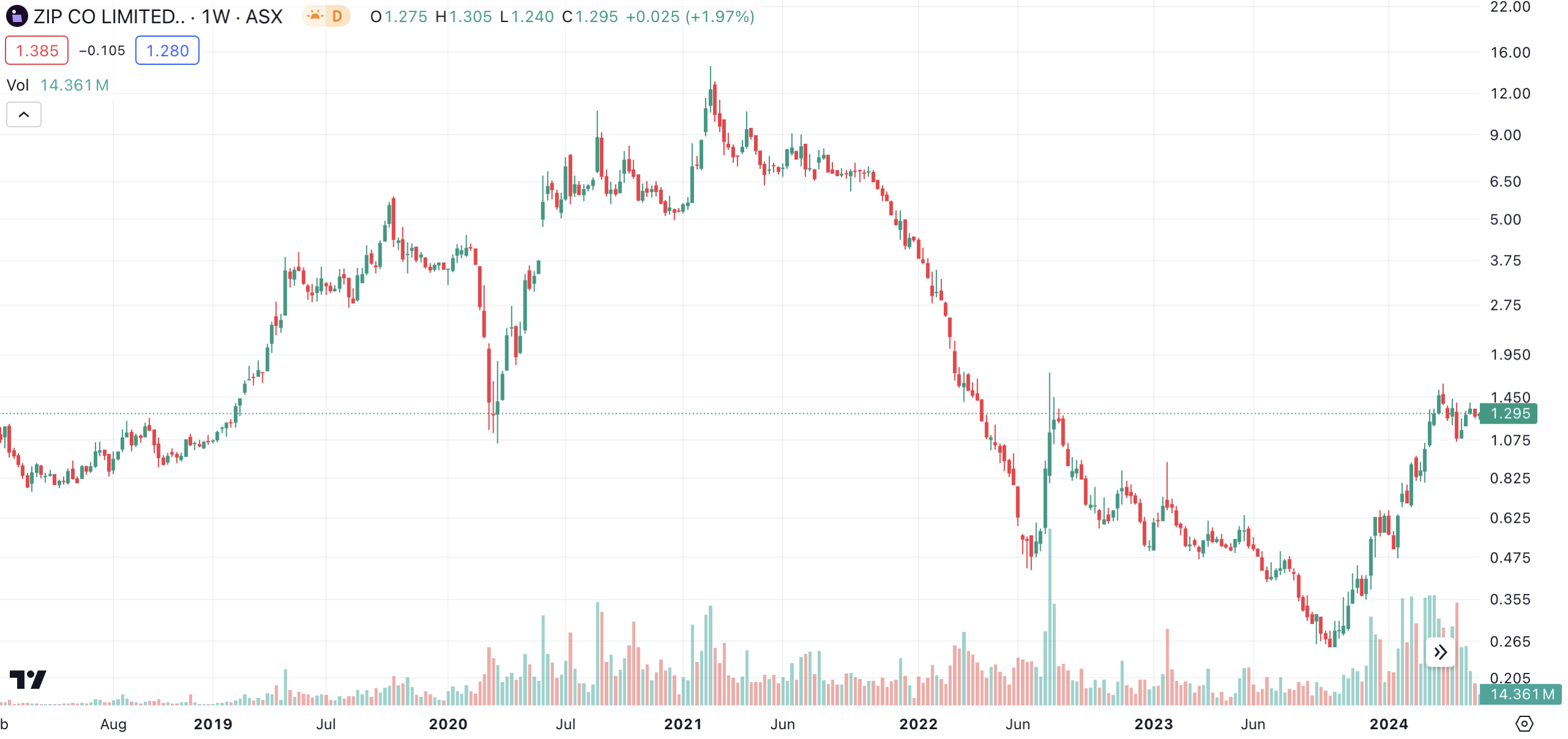Zip shares have doubled in 12 months, but is this a legitimate turnaround or a dead cat bounce?

Ever since Afterpay was taken over in 2021, Zip shares have remained the best way to play the Buy Now, Pay Latеr (BNPL) spacе. Zip has consistently been the second-best player in Australia behind Afterpay and has made significant forays into international markets.
The BNPL business model is intended to disrupt credit cards, allowing people to pay for goods in instalments without paying interest. The merchant bears the cost in terms of fees paid. The incentive for the merchant is gaining business they otherwise would not have, or gaining a higher order volume than it otherwise would.
Zip shares have had a rollercoaster ride
Zip was established in 2013 and from then until 2021, high-growth tech companies could obtain virtually endless capital. It didn’t matter if it had a profitable business model, or tonnes of competition – high growth numbers were sufficient. Shares went as high as $12 in mid-2021.
As interest rates rose as rapidly as they did, and the Millennial and Gen Z customers of BNPL companies cut back on their spending, BNPL shares came under pressure and Zip were no different – falling well under $1. In a fight to survive, the company exited plenty of international markets and made an attempt to merge with Sezzle, only to call it off. At least it is still standing (for now) – not all BNPL players survived.

Zip (ASX:ZIP) share price chart, log scale (Source: TradingView)
Optimism in thе Air
But dеspitе thеsе currеnt difficultiеs and scepticism from certain analysts (the average target price amongst analysts is actually a ~7% discount to the current share price), there is some optimism that Zip is recovering. In its most recent market update, Zip reported $20.1m cash EBITDA in the March quarter of 2024, thanks to strong performance from the US. The company’s revenue in the US is up 50% year on year and transaction volume is up 44%. It has 3.8m active customers in the US are 3.8m. Things are going well in Australia too with BNPL transaction at an all-time high and set to account for $15bn worth of e-commerce transactions by 2027. There is speculation it might be bought out by a larger rival such as Klarna, Affirm or Afterpay owner Block, or perhaps by one of Australia’s Big Four Banks.
Still, there is concern that BNPL still may be subject to regulation. You might say,’ Oh, but we’ve heard it will happen for years and years and nothing has happened’. True. But this time it is different. It does not appear to be the casethat it’ll have to perform the same credit checks credit card companies have to, regulators are now looking at requiring BNPL providers to remove their no-surcharge rules. It was only earlier this month (May 2024) that the Senate Economic Legislation Committee approved legislation to expand the RBA’s payment powers to designate and regulate a broader range of payment systems, including BNPL, but also Apple and Google Pay. The RBA may look to impose mandatory surcharging that credit card providers have to do. This would be a significant dent in margins and may hurt demand (but maybe it won’t impact demand so long as providers like Zip do not have to undertake the same credit checks done by other credit providers).
The only thing that is certain right now is that investors can be pleased that Zip has not gone the way of Openpay or Payright. In our view, investors hoping that shares can recover to $12 are way too optimistic. Nonetheless, there may be some more growth upside if it can continue to grow in the US.
What are the Best ASX Stocks to invest in right now?
Check our buy/sell tips

Blog Categories
Get Our Top 5 ASX Stocks for FY26
Recent Posts
Austal (ASX:ASB) Wins A$4bn Navy Deal: Is It Time to Buy the Dip?
Austal’s Defence Surge: What Investors Should Watch Austal (ASX: ASB) closed at A$6.30 on Friday, up 5.53% on the day,…
Oil Surges on Iran Crisis: Best ASX Energy Stocks to Buy Now
ASX Energy Stocks: What the Oil Spike Means Now Oil prices surged more than 5% in just two trading sessions…
ASX Reporting Season Halftime Report: 4 Stocks to Buy, Hold, or Avoid After This Week’s Results
ASX Reporting Season: What This Week’s Results Mean for Investors We are halfway through the ASX reporting season, and the…


